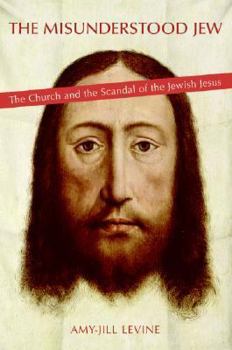The Misunderstood Jew: The Church and the Scandal of the Jewish Jesus
Select Format
Select Condition 
Book Overview
Country Western singer Kinky Friedman often performs a song entitled "They Ain't Making Jews Like Jesus Anymore," and New Testament professor Amy-Jill Levine would agree. In fact, her career is dedicated to helping Christians and Jews understand the Jewishness of Jesus, thereby deepening the understanding of him, and facilitating greater interfaith dialogue. In this book, she shows how liberal Christians misunderstand Judaism, misunderstand the New...
Format:Hardcover
Language:English
ISBN:0060789662
ISBN13:9780060789664
Release Date:November 2006
Publisher:HarperOne
Length:256 Pages
Weight:1.00 lbs.
Dimensions:0.9" x 6.0" x 9.0"
Customer Reviews
3 ratings
Jesus is Jewish!
Published by Thriftbooks.com User , 16 years ago
This is the best book available today about the Jewishness of Jesus. Amy Jill Levine points out that many of the Gospel stories would hit home with more of us if we read the New Testament with the eyes of a first century Jewish person. She points out the Jewishness of each line of the Lord's Prayer and its similarities with the Mourner's Kaddish in Judaism. She also shows that the parable of the Good Samaritan will be more powerful when we realize that the role model of the story is the enemy of the Jews. Similarly, the parable of the tax collector and the self-righteous Pharisee praying in the temple has a bigger punch when we remember how despised tax collectors were and how unlikely it would seem that a sinful, self-centered tax collector would repent and turn to the Jewish God. There is also an important chapter about anti-Judaism in the New Testament. Levine feels that the issue of whether or not there is anti-Judaism in the NT cannot be decided by the historian, but by the individual. Some will see it in the text, some won't. I wanted to argue at this point. I wanted to say "What about authorial intent? Can't we study the salient passages in their contexts to see if the authors intended an anti-Jewish polemic?" But Levine would rightfully note that we all have different reactions to what we read. Even though she rejects this notion, I still see it as a family disagreement. There is also an important chapter about the dangers of stereotyping Judaism. Levine notes that when we preach the gospels, we talk about the harsh legalism of the Pharisees, the strain of women under the law of Moses, the idea that the Jewish people rejected Jesus because he wasn't a warrior messiah, the idea that the Jewish people were obsessed with the idea of keeping pure from outsiders, and the impossibility of keeping the law of Moses. Levine points out that these are stereotypes, this is NOT the way the Jewish people looked at their lives. Levine also calls for true interfaith dialogue. This means avoiding statements like "All Jews think ..." or "All Christians think ...." It also means recognizing that both Jewish and Christian traditions have texts that might rub the other dialogue partner the wrong way. Levine counsels us to speak out when someone makes a derogatory comment about Jewish people or Christian people. There is no room for hate at the table of faith. I agree. And yet there is a clear message in the New Testament that Jesus Christ is superior to the institutions of Judaism, especially in the book of Hebrews and in certain texts from Galatians and the gospels. I think this is an important message. The Jewish writers of the New Testament were transformed by their faith in Jesus Christ. They felt so passionately about their Messiah that they even stated that faith in Him was superior to anything else Judaism could offer. As a Jewish believer in Jesus as Messiah, I wholeheartedly concur. Nevertheless, Ben Witherington is surely right when he ca
Towards Mutual Understanding
Published by Thriftbooks.com User , 16 years ago
This is a first-rate publication that takes the reader into the Jewishness of Jesus in a vivid manner while sensitive to Jewish-Christian differences. The book is both scholarly as well as pastoral for it seeks to establish common links and points of commonality between the religions. A must-read for anyone interested in Christian-Jewish dialogue today....and for understanding the outlook of much of the New Testament.
Wake up
Published by Thriftbooks.com User , 17 years ago
This book is a wake up call for all Christians to no longer rely on what they have heard from the pulpit about the Jewish culture and faith during the lifetime of Jesus. The Misunderstood Jew should be required reading in every seminary. Finally a scholar breaks down the complex issues that strain Jewish/Christian relationships and provides suggestions for moving forward with intelligent dignity for both backgrounds of faith. Probably the most important religious book of this decade.





